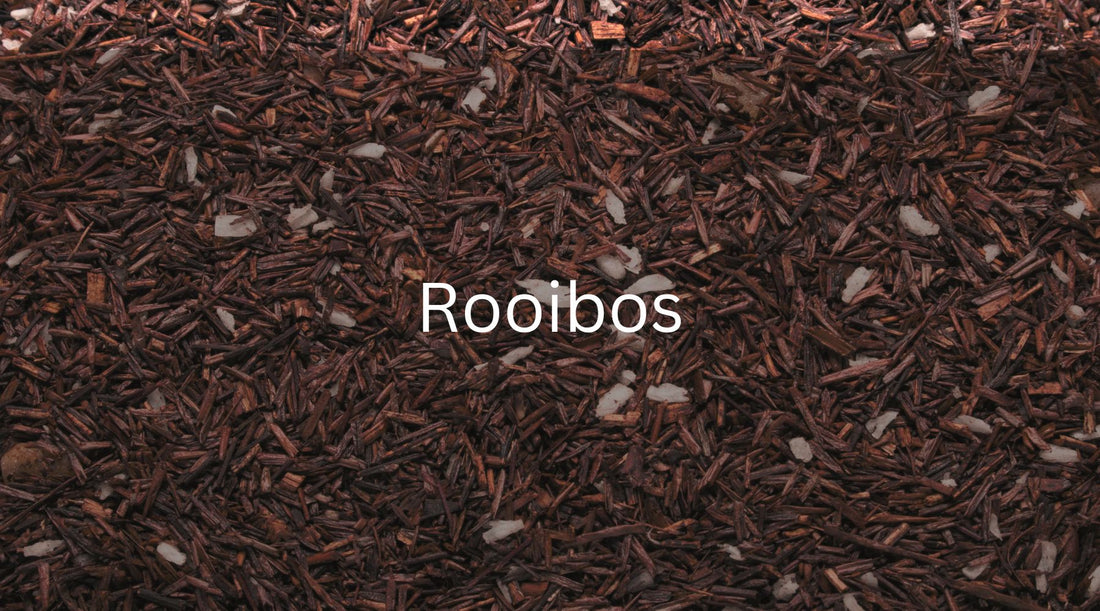Rooibos is a delicious and caffeine-free infusion that comes from a plant native to South Africa. It has a rich history, a unique flavor and a ton of health benefits, especially for your mental well-being. Let's dive into the fascinating world of rooibos tea!

What is rooibos?
Rooibos (pronounced "roy-boss") is typically consumed in an herbal tea from the leaves of a shrub called Aspalathus Linearis. It is made from the leaves and stems of the Aspalathus linearis plant, which belongs to the legume family. The plant grows in the Cederberg region of South Africa, a mountainous area with a diverse and protected wildlife. Rooibos is the only plant in the world that produces this type of tea, and South Africa is the only country that cultivates it.
Rooibos tea has a reddish-brown color and an earthy, sweet and slightly nutty flavor. It can be enjoyed hot or cold, plain or with milk, honey, lemon or other ingredients. Rooibos tea is naturally caffeine-free and low in tannins, which makes it a great choice for people who are sensitive to caffeine or who want to avoid staining their teeth.

What are the cultural traditions of rooibos tea?
Rooibos tea has been used for centuries by the indigenous people of Southern Africa, especially the Khoi and San tribes. They would harvest the wild rooibos plants from the mountains, cut the leaves and stems into small pieces, bruise them with hammers and leave them to ferment in heaps. Then they would dry them in the sun and brew them into a herbal infusion.
Today, rooibos tea is enjoyed by millions of people around the world and is an important part of South African culture and economy. Rooibos tea is also used in cooking, baking, cosmetics and liqueurs.
What benefits does rooibos tea have?
Rooibos tea is not only tasty, but also very good for you. It contains a variety of antioxidants, minerals and vitamins that can help you stay healthy and happy. Some of the health benefits of rooibos tea are:
- Improving heart health: Rooibos tea may help lower blood pressure, cholesterol, and triglycerides levels, which are risk factors for heart disease. It may also prevent blood clots from forming and improve blood flow to the heart.
- Reducing blood sugar: Rooibos tea may help regulate blood sugar levels by stimulating insulin production and enhancing glucose uptake by cells. It may also protect against oxidative stress and inflammation in the pancreas, which are involved in diabetes development.
- Improving skin health: Rooibos tea may help improve skin conditions such as eczema, acne, psoriasis, and dermatitis by reducing inflammation and itching. It may also protect against sun damage and aging by scavenging free radicals and boosting collagen production.
- Supporting digestion: Rooibos tea may help relieve digestive problems such as indigestion, nausea, vomiting, diarrhea, constipation, and stomach ulcers by soothing the stomach lining and reducing spasms and cramps. It may also act as a prebiotic, which is a type of fiber that feeds the beneficial bacteria in the gut.
- Enhancing immunity: Rooibos tea may help boost the immune system by increasing the production and activity of white blood cells, which fight infections and diseases. It may also modulate the immune response and prevent excessive inflammation, which can cause autoimmune disorders.

Rooibos and Mental Health
One of the most amazing benefits of rooibos tea is its effect on your mental health . Rooibos tea can help you relax, reduce stress, improve your mood and sleep quality. How does it do that? Well, rooibos tea contains two compounds that are very important for your brain: magnesium and L-theanine.
Magnesium is a mineral that plays a vital role in regulating your nervous system, your hormones and your neurotransmitters. Magnesium can help you calm down, balance your emotions and cope with anxiety and depression.
L-theanine is an amino acid that is also found in green tea. L-theanine can help you increase your focus, creativity and learning ability. It also stimulates the production of serotonin and dopamine, which are neurotransmitters that make you feel happy and motivated.
How to make rooibos tea?
Making rooibos tea is very easy and fun. You can use loose leaf rooibos or rooibos tea bags, depending on your preference. Here are some simple steps to follow:
- Boil some water in a kettle or a pot
- Put one teaspoon of loose leaf rooibos or one rooibos tea bag per cup in a teapot or a mug
- Pour the boiling water over the rooibos and let it steep for 5 to 10 minutes, depending on how strong you like it
- Enjoy your rooibos tea as it is or add some milk, honey, lemon or other ingredients to enhance the flavor
You can also make iced rooibos tea by letting it cool down and adding some ice cubes, or by brewing it in cold water overnight in the fridge. You can also experiment with different flavors and combinations, such as vanilla, mint, ginger, cinnamon, orange, apple, etc.

Experiment
Remember that it is important to experiment with different quantities and flavor combinations to find what works best for your unique body chemistry. We pair our rooibos with hibiscus, noni leaf, and passionflower in the Happy Hibiscus blend.
Rooibos tea is a versatile and healthy drink that you can enjoy any time of the day. It has a long history and a variety of benefits that make it a valuable addition to your diet. Whether you drink it hot or cold, plain or flavored, rooibos tea can help you stay hydrated, refreshed, and nourished.
Our Tea
We blended organic rooibos with hibiscus, noni leaf, and passionflower to build an antioxidant, powerhouse tea. We call it Happy Hibiscus. The beauty of hibiscus and rooibos together can't be matched.
Precaution
When drinking herbal tea for anxiety or stress, it's important to remember that it's not a substitute for professional help. If you're struggling with mental health issues, it's important to seek help from a qualified healthcare provider. Herbal tea can be a supportive addition to your treatment plan, but it's not a replacement for professional care.
Citations
- Link - Rooibos herbal tea: An optimal cup and its consumers
- Link - Rooibos influences glucocorticoid levels and steroid ratios in vivo and in vitro: a natural approach in the management of stress and metabolic disorders?
- Link - Anti-Oxidative Effects of Rooibos Tea (Aspalathus linearis) on Immobilization-Induced Oxidative Stress in Rat Brain

